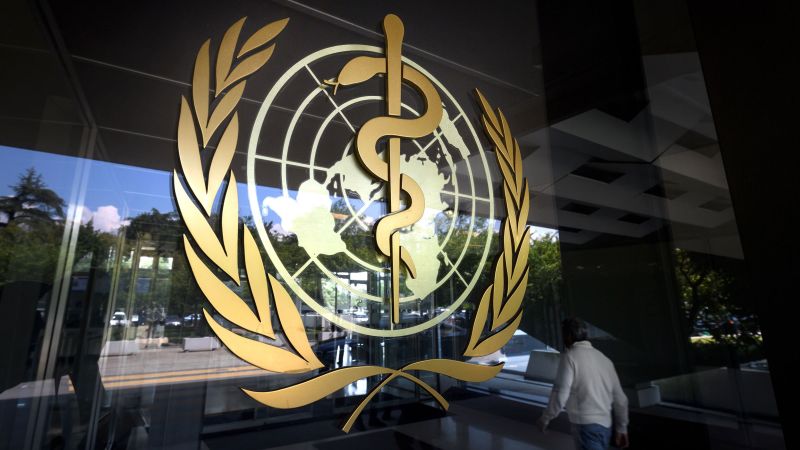
CNN
–
The World Health Organization said on Monday that COVID-19 remains a global health emergency, but acknowledged that the pandemic was in a “transitional phase”.
The WHO’s International Health Regulations Emergency Committee discussed the pandemic on Friday at its 14th meeting on Covid-19, and Director-General Tedros Adhanom Ghebreyesus agreed that the declaration of a Public Health Emergency of International Concern should continue.
in statment Released on Monday, the WHO Advisory Committee said it had urged the WHO to propose “alternative mechanisms to maintain the global and national focus on COVID-19 after the initial health emergency has ended.”
“Achieving higher levels of immunity in the global population, either through infection and/or vaccination, may limit the impact of SARS-CoV-2 on morbidity and mortality, but there is no doubt that this virus will remain a permanently established pathogen in humans and animals for the foreseeable future. As such, there is an urgent need for long-term public health action,” the commission said in a statement Monday. “While eliminating this virus from human and animal reservoirs is highly unlikely, mitigating its devastating impact on morbidity and mortality is achievable and should remain a priority goal.”
In a list of interim recommendations, Tedros said countries should continue to vaccinate people and incorporate Covid-19 vaccines into routine care; improved disease surveillance; maintaining a strong health care system to avoid a “cycle of panic and neglect”; continue to fight misinformation; and adjusting international travel procedures based on risk assessment.
The organization declared the coronavirus outbreak a health emergency in January 2020, about six weeks before it was classified as a pandemic.
The State of Health Emergency (PHEIC) establishes an agreement between countries to adhere to WHO emergency management recommendations. Each country, in turn, declares its own public health emergency — declarations that carry legal weight. States use it to mobilize resources and compromise rules in order to mitigate the crisis.
The US also remains under its own public health emergency declaration, which US Secretary of Health and Human Services Xavier Becerra recently renewed on January 11.
More than 170,000 people have died from Covid-19 in the past eight weeks, Tedros said last week when announcing the committee meeting, and that although the world is better equipped to manage the pandemic than it was three years ago, it is still “very” . Concern about the situation in many countries and the high number of deaths.
While global Covid-19 deaths are trending higher, the seven-day average remains well below pre-pandemic points, according to data from Johns Hopkins University.
Last week, before the committee met, Tedros implored countries not to give up in the fight against Covid-19.
“My message is clear: do not underestimate this virus,” he said. “It has surprised us and will continue to, and will continue to kill unless we do more to provide health tools to people who need them and comprehensively tackle misinformation.”
Also on Monday, the International Federation of Red Cross and Red Crescent Societies released two new reports warning that “all countries remain seriously unprepared for future outbreaks”.
The Secretary General of the International Federation of Red Cross and Red Crescent Societies, Jagan Chapagin, said the COVID-19 pandemic should be a “wake-up call”.
“The next pandemic could be just around the corner,” he said New release.
Reports suggest that many of the effects of the Covid-19 crisis on countries, such as job loss, poverty, learning loss, food insecurity and increased mental health issues, could have been avoided if governments had invested in emergency preparedness. They recommend countries prepare for simultaneous risks, such as disease outbreaks and extreme weather events.
“We need to start preparing now, as our world is becoming increasingly dangerous,” according to the International Federation of Red Cross and Red Crescent Societies. World Disasters Report 2022 Noting that many disasters are caused by climate change. In 2021, 378 disasters were recorded — not including disease outbreaks — which is higher than the 20-year average of 337 disasters annually. Many countries have had to respond to hazards such as hurricanes and floods while also dealing with COVID-19.”
The report urges “community-wide action” to prepare for disaster on the front lines, addressing existing economic and racial inequalities so that they are not exacerbated when disaster strikes.
International Federation of Red Cross and Red Crescent Societies A report that concerns everyone 2023 It also emphasizes “local resilience,” by building and investing in the “public health, sanitation, shelter, and economic security” of communities.
Ultimately, the report states, “Nobody is safe until everyone is safe. The pandemic is not over and there is no response.”

“Travel specialist. Typical social media scholar. Friend of animals everywhere. Freelance zombie ninja. Twitter buff.”





More Stories
Taiwan is preparing to face strong Typhoon Kung-ri
Israel orders residents of Baalbek, eastern Lebanon, to evacuate
Zelensky: North Korean forces are pushing the war with Russia “beyond the borders”